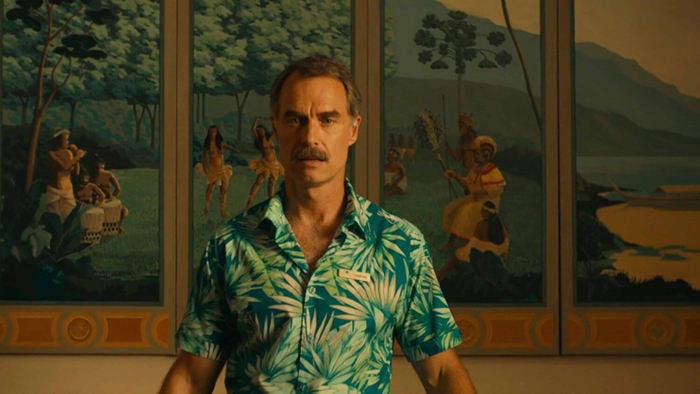What money and power makes you do: The craven morality of The White Lotus
One surprising fact about Mike White, the creator, writer and director of HBO’s The White Lotus, is that he’s obsessed with and starred in a season of Survivor, the brutal reality TV show that pits strangers against each other in a complex game of wits and skill.
Of course White’s a Survivor junkie. The two seasons of The White Lotus – a soap opera-cum-murder mystery about a bunch of depraved rich people who exploit the surplus of expendable workers who man the titular hotel they stay at – are united by their fixation on the ways human beings outwit and outgame each other.
The White Lotus takes it as a given that human beings want things from each other, and use their (varying levels of) intelligence and power to get those things. There’s not an innocent in either season of the show, and their moral failings range from the petty and pathetic to the grand and soul-blemishing. Shane (Jack Lacy) kicks off the first season by whining and berating the hotel staff in order to get what he feels owed. Armond (Murray Bartlett), the long-suffering hotel manager, ignores one of his staff members when she goes into labour. They’re a den of thieves and miscreants, whose naked wants trump any sense of obligation to one another.
Even Tanya (Jennifer Coolidge), the only character who spans both instalments, is a hero only by virtue of being less openly murderous. Her slow realisation in the show’s second season that she is sat at the direct centre of a conspiracy motivated by greed is tragic, sure. But by the time we see her mutter her instantly iconic line about the gays who are trying to murder her, we’ve already watched her dangle her considerable wealth in front of Belinda (Natasha Rothwell) and then withdraw it, dishonestly, the moment she becomes the object of someone’s lustful affections.
These characters operate in what philosopher John Locke refers to as “the state of nature.” Locke, one of the founders of modern liberalism, believed that left to their own devices, without society, human beings live lives that are “nasty, brutish and short.” There is no sense of community, or solidarity, in the state of nature. All people want is what they want, and they live in a continuous state of never denying their desires.
So it goes in The White Lotus. The characters are nominally part of a culture – the kind of society that Locke hoped would block bad behaviour. After all, for Locke, mutual beneficence is the glue that holds us together – you scratch my back, I’ll scratch yours. You refrain from killing me, so I won’t kill you either.
But Locke’s hope that the stratas and rules inherent in a society would keep its citizens ethical is blown apart by The White Lotus. Alliances form in the world of the show, sure. But these are temporary, fleeting, purely opportunistic. Belinda and Tanya don’t like each other. They need each other. Ethan (Will Sharpe) and Harper (Aubrey Plaza) might have a connection, but it’s not strong enough to hold together in the face of changing fortunes and friendships.
Importantly, so it goes across class divides. Though the show has been touted as part of a wave of modern works of art that take aim at the rich – from Parasite to The Menu – the show does not reserve its ire merely for the upper class. What sets The White Lotus apart from much “we are the 99%” cinema and television, is the way it examines the pressure that capital places on all citizens, the haves and the have nots alike.
Bitch Better Have My Money
Thorstein Veblen, the Austrian sociologist, is best known for his book The Theory Of The Leisure Class. Veblen examines the hallmarks of the elite, and finds one in common across a multitude of cultures. Simply put, Veblen says, rich people like excess. They like to spend money on things that they don’t have to spend money on.
The characters of The White Lotus are driven by this need for excess.
They want more than they could ever need. And because of this want, their lives are transformed into a series of opportunities. Wealth and power become means to garner more wealth and power.
The Di Grasso family of the second season are the perfect example of this. Some wealthy families have a “crest”, a pictorial representation of their values. The Di Grasso family’s crest would be a den of rats, ignoring their stockpile of food, and instead choosing to chew each other’s tails.
This is a family that, over generations, has learned that the world is nothing more than a series of goals, which lead to nothing but more goals. Bert (F. Murray Abraham), the family’s patriarch, has created a miniature culture that revolves around himself, in which sex is an opportunity for manipulation, wealth is an opportunity for manipulation, and love is an opportunity for manipulation.
And his brood, desperate to emulate him, and attract his affection – if only to get ahead themselves – have followed in his lead, even if they don’t realise it. For this family, nothing and no-one ever sits as they lay – nothing is discrete, or for itself. Bert might be viewed by the other characters as a mostly impotent, harmless old man, a wannabe peacemaker who has lost touch. But he is as single-minded as ever, even in his old age, and he spends the second season analysing the weakness of others, and then using those weaknesses for his own gain.
This opportunistic streak extends to the entire solar system of vapid and cruel characters in the second season. Tanya is exploited for her deep loneliness, and her own desire to exploit others stops her from realising the danger she’s in until too late. Lucia and Mia, the strongest-hearted characters of the second season, all things told, come into themselves as creatures who know how to get what they want, and what they have to do to get those things. No honour among thieves, and no values but the shifting goalpost of immorality, which reduces the world to a series of people to fuck over, and be fucked over by.
And for what? The striking thing about The White Lotus is how little this all means. All that suffering, all that exploitation, and the only prize at the end is a consolation prize. It’s not for nothing that each season’s murder turns out to be a whimper, rather than a bang. In the first season, Armond dies after a feces-based prank goes pathetically wrong, running himself into a blade. And in the second season, Tanya manages to (somewhat) extricate herself from a conspiracy to murder her, gun blazing, only to die thanks to an ungainly fall.
Checks out. If what marks the upper class is their fixation on the pointless, the too-much, then of course their fates are pointless too. Even those who win don’t win much. And those who lose – well, they lose hard, falling backwards into the den of conniving players that they have tried and failed to connive.




